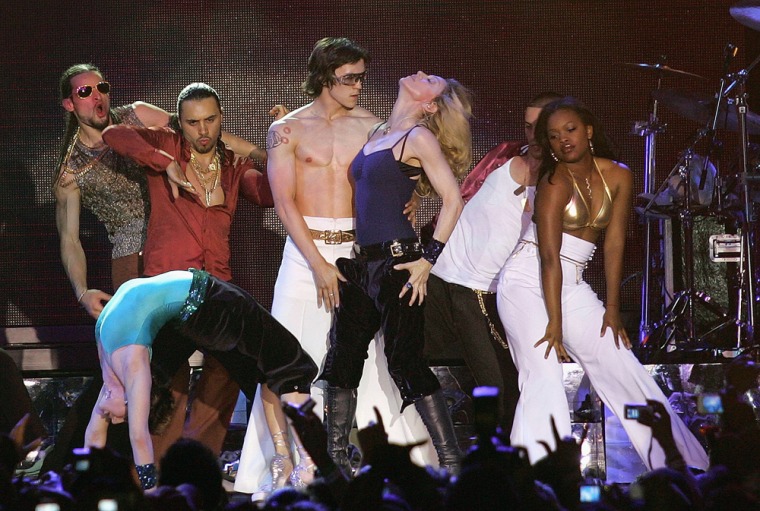Once again the Material Girl is living up to her nickname. When her 15-week tour kicks off in Inglewood, Calif., on May 21, Madonna will be asking her fans to shell out up to $375 a person to watch her strut her stuff on stage. She won't be the only aging star asking such high prices. Tickets to comeback kid Barry Manilow's tour cost the same amount on the high end and, if the rumors are right, Barbra Streisand could go on stage in front of people who paid as much as $2,500 apiece to be there.
None of the three biggest-grossing acts from last year, The Rolling Stones ($162 million), U2 ($138.9 million), and Paul McCartney ($77.3 million) are planning a blockbuster U.S. tour this year. Their absence leaves the door open to other top-tier acts, like Madonna, Manilow and the king of Margaritaville, Jimmy Buffett, who will charge upwards of $150 for some premium seats.
Madonna's last two tours — "Drowned World Tour" in 2001 and "Re-Invention World Tour" in 2004 — grossed a combined $200 million, and this year, her promoters are going for even more. According to Britain's Daily Telegraph, this tour, though only half the size of the Stones or U2 of last year, is expected to gross upwards of $190 million due to higher ticket prices.
Golden circle
The top acts around the world have been charging high prices for some time. Though Streisand, who brought in a reported $2,500 a head for "Golden Circle" tickets when she played the MGM Grand in Las Vegas on New Year's Eve 1999-2000, and the Rolling Stones, who charged up to $450 per seat in last summer's tour, are still the priciest, more artists are getting a bigger premium from their ticket sales. And they're doing what they can to keep the money in their own hands, and out of the scalpers'.
In 1985, the average ticket price for one of the top 25 acts performing that year, like U2, was $15.13, according to Pollstar, a music industry trade publication. By 1995, the top 50 acts raked in $25.40 per ticket. By 2005, that number had more than doubled, to $56.88. And that's for the top 100 acts.
Across the board, it seems, people are willing to pay a premium for quality live entertainment. In New York's theater district, the recent phenomenon of "premium tickets" for Broadway shows has caught on in recent years, beginning with the producers behind "The Producers." The model is simple: Producers and event promoters set aside a group of tickets and mark up the price for the die-hard fans, those with disposable incomes, or corporations that purchase large blocks of tickets for clients, says Sam Craig the director of the Media & Entertainment program at the NYU Stern School of Business.
Pushing the envelope
For Broadway shows, sporting events, and increasingly for concerts, these premium tickets have found a market. While ticket sales for Broadway shows are up 4 percent, revenue is up 12 percent in 2006 for just this reason, says Alan Cohen, a spokesman for the League of American Theatres, with one big difference. "The producers are now capturing the revenue, instead of scalpers," says Cohen, because premium tickets are available up until the last minute.
The same is true for concert promoters, who have a lot more tools for evaluating demand than they once did. If tickets to a given show are popping up on eBay and Craigslist.com, two of the most popular sites for scalpers to sell their wares, then promoters know that demand for a higher price exists. Thus, they can push the envelope more courageously.
Promoters and concert organizers need to be careful not to alienate too many fans with their exorbitant prices, however, or their concerts will stop selling out. "The sky is not the limit — it's about getting demand and supply in equilibrium," says NYU's Craig.
There are signs that the equilibrium is close to its tipping point. As ticket prices have increased, sales have gone down. The total number of tickets sold dropped from 37.6 million in 2004 to 36.1 million last year, while average prices were the highest ever, up 8.8 percent from 2004, according to Pollstar.
Rip this track
To restore that fleeting balance between supply and demand, Ticketmaster has invented its own gauge of ticket values. Through Ticketmaster Auctions, promoters, artists, and venues now have a tool to determine fair market value for tickets, not just by section. Customers bid online by seat. Bonnie Poindexter, a spokesperson for Ticketmaster, says it's yet another way that promoters are keeping the money in legitimate hands and out of scalpers'. And it's catching on quick. Since 2003, when the service was launched, use has taken off. In 2005, Ticketmaster saw a 687 percent jump as clients are putting more tickets at more shows up for auction.
But just because a band’s tickets are listed for a reasonable price on Ticketmaster.com doesn’t mean you won’t pay more. Rock band Radiohead’s tickets are listed on the Web site for $41. Bryan Mendez, a 25-year-old Radiohead fan, says his girlfriend was supposed to surprise him with tickets to the show at Madison Square Garden in New York, but she was shut out of the online ticket sales. He immediately checked eBay and Craigslist.com, and the tickets were already selling for between $200 and $400 each. “Ticket prices are just ridiculous,” says Mendez. “I’ve been going to concerts since 1995 when tickets were $15 each, and since then they’ve just been going up and up and up.”
When all is said and done, it seems that the profits from these high-priced tickets are going increasingly to the artists and producers, and less to the scalpers. But even with the possibilities furnished by the Internet, it's costing just about everyone more to see their favorite concerts this summer. No wonder iTunes has a hit on its hands with its 99-cent downloads.
